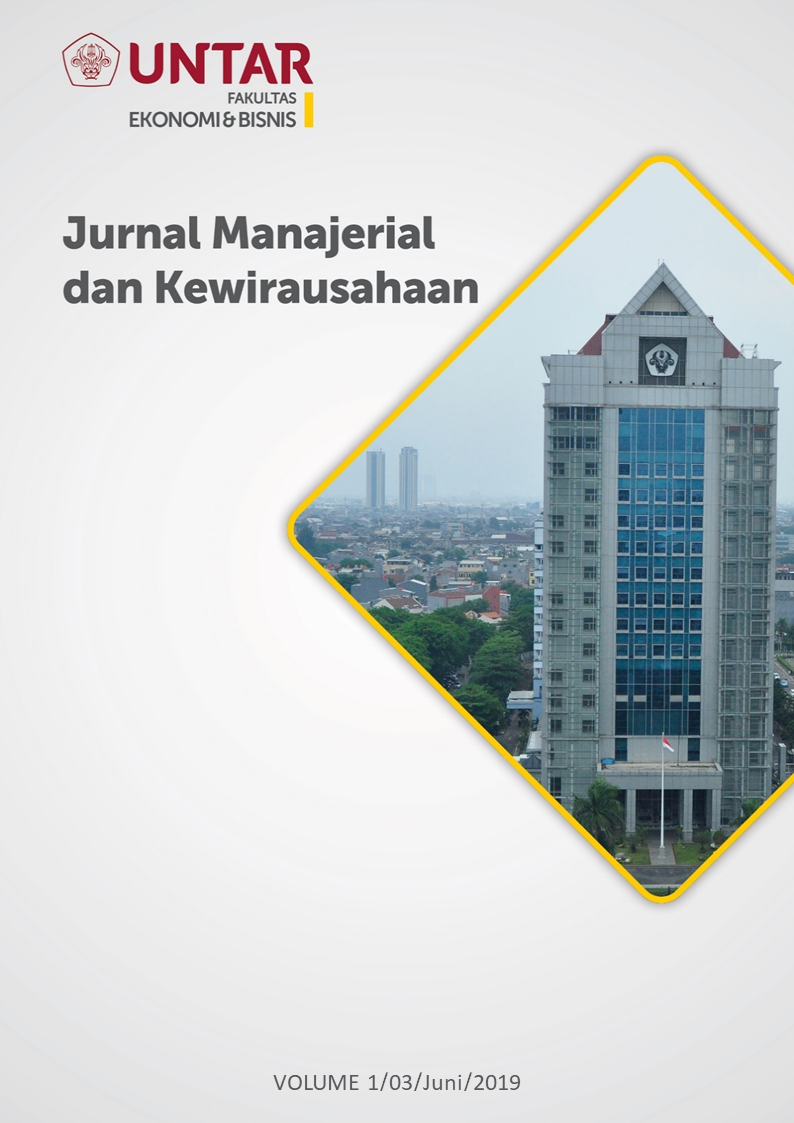Prediksi Self Efficacy Dan Personality Traits Terhadap Entrepreneurial Intentions Di Kalangan Mahasiswa
Main Article Content
Abstract
This study was conducted to determine the relationship of self-efficacy and personality traits to entrepreneurial intentions of Tarumanagara University Faculty of Communication Science students. The sampling menthod is done by purposive sampling method. Data collection was done by distributing questionnaires to 100 respondents. The data analysis technique uses the structural least partial (PLS) model. The results of this study are that there is no significant positive relationship between self-efficacy, conscientiousness, and extraversion with Tarumanagara University Faculty of Communication students entrepreneurial intentions, there is no negative relationship significant between neuroticism and entrepreneurial intentions of Tarumanagara University Faculty of Communication Sciences students. In addition, there is a significant positive relationship between openness to experience and agreeableness with entrepreneurial intentions of Tarumanagara University Faculty of Communication students students
Penelitian ini dilakukan untuk mengetahui hubungan self-efficacy dan personality traits terhadap entrepreneurial intentions mahasiswa Fakultas Ilmu Komunikasi Universitas Tarumanagara. Metode pengambilan sampel dilakukan dengan metode purposive sampling. Pengumpulan data dilakukan dengan membagikan kuesioner ke 100 responden. Teknik analisis data menggunakan teknik structural equation model partial least square (PLS). Hasil dari penelitian ini adalah tidak terdapat hubungan positif yang signifikan antara self-efficacy, conscientiousness dan extraversion dengan entrepreneurial intentions mahasiswa Fakultas Ilmu Komunikasi Universitas Tarumanagara, tidak terdapat hubungan negatif yang signifikan antara neuroticism dengan entrepreneurial intentions mahasiswa Fakultas Ilmu Komunikasi Universitas Tarumanagara. Selain itu terdapat hubungan positif yang signifikan antara openness to experience dan agreeableness dengan entrepreneurial intentions mahasiswa Fakultas Ilmu Komunikasi Universitas Tarumanagara.
Article Details
This work is licensed under a Jurnal Muara Ilmu Ekonomi dan Bisnis Creative Commons Attribution-ShareAlike 4.0 International License.,/p>
References
Ajzen, I. (1991). The theory of planned behavior. Orgnizational Behavior and Human Decision
Processes, 50, 179–211.
Akanbi, S. T. (2013). FAMILIAL FACTORS, PERSONALITY TRAITS AND SELF-EFFICACY AS
DETERMINANTS OF ENTREPRENEURIAL INTENTION AMONG VOCATIONAL
BASED COLLEGE OF EDUCATION STUDENTS IN OYO STATE, NIGERIA, 13(2), 66-
Bandura, A. (1994). Self-efficacy. In. VS Ramachaudran. Encyclopedia of human behavior, 4(4),
-81.
Farrukh, M., Khan, A. A., Shahid Khan, M., Ravan Ramzani, S., and Soladoye, B. S. (2017).
Entrepreneurial intentions: the role of family factors, personality traits and self-efficacy.
World Journal of Entrepreneurship, Management and Sustainable Development, 13(4),
-317. doi:10.1108/wjemsd-03-2017-0018
Gelaidan, H. M., and Abdullateef, A. O. (2017). Entrepreneurial intentions of business students in
Malaysia. Journal of Small Business and Enterprise Development, 24(1), 54-67.
doi:10.1108/jsbed-06-2016-0078
GRIFFIN, R. W., and MOORHEAD, G. (2013). Organizational Behavior: Managing People and
Oranizations (11th ed.). Cengage Learning.
John, O. P., and Srivastava, S. (1999). The Big Five trait taxonomy: History, measurement, and
theoretical perspectives. Handbook of personality: Theory and research, 2(1999), 102-
Kompas Cyber Media. (2017) Menkop Sebut Rasio Wirausaha Terus Meningkat (Retrieved
from:
https://bisniskeuangan.kompas.com/read/2017/03/11/191200526/menkop.sebut.rasio.wir
ausaha.terus.meningkat/11-03-2017)
Pihie, Z. A., and Bagheri, A. (2013). Self-Efficacy and Entrepreneurial Intention: The Mediation
Effect of Self-Regulation. Vocations and Learning, 6(3), 385-401. doi:10.1007/s12186-
-9101-9
Ranwala, R.S. and Dissanayake, D.M.N.S.W. (2016). Big Five Personality Traits and
Entrepreneurial Inclination : A Study Based on Sri Lankan Undergraduates. Social and
Basic Science Reserach Review, 4(4), 84–98.
Tenenhaus, M., Vinzi, V. E., Chatelin, Y. M., and Lauro, C. (2005). PLS path
modeling. Computational statistics & data analysis, 48(1), 159-205.
Yang, J. (2013). The Theory of Planned Behavior and Prediction of Entrepreneurial Intention
Among Chinese Undergraduates. Social Behavior and Personality: an international
journal, 41(3), 367-376. doi:10.2224/sbp.2013.41.3.367



